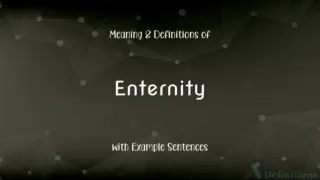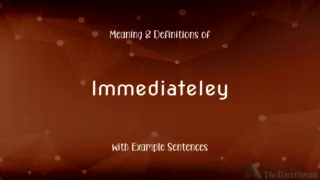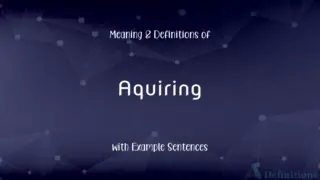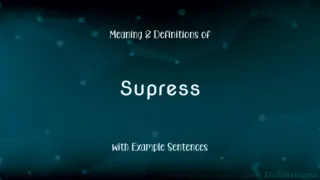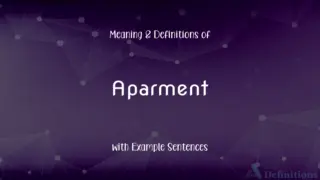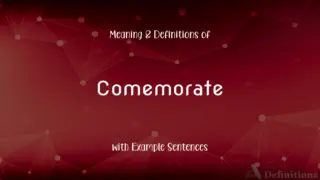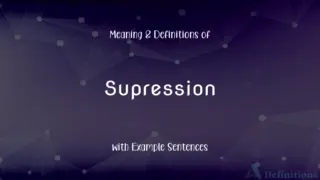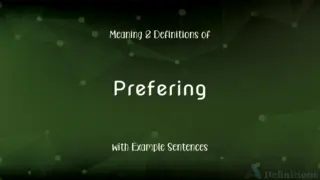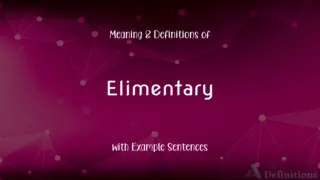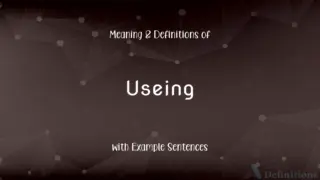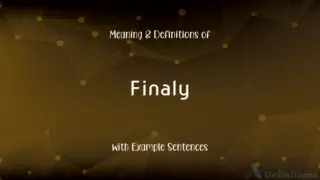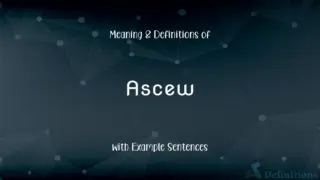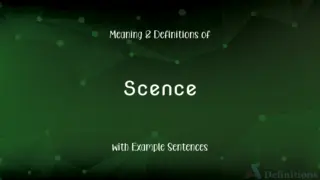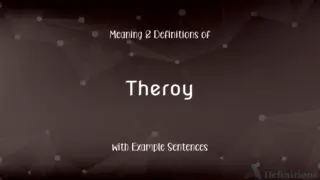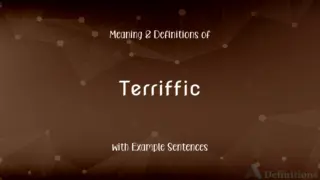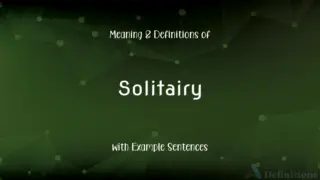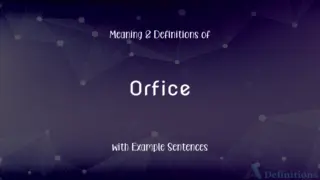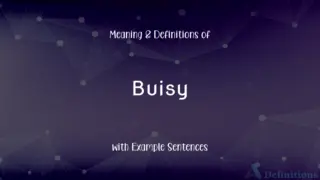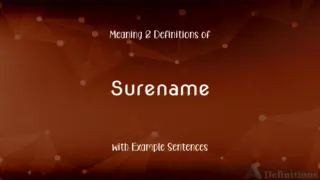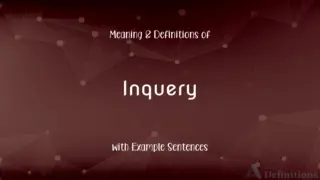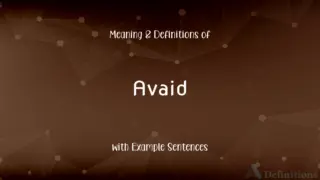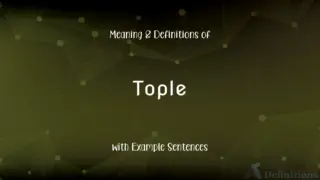Concerte Meaning and Definition
"Concerte" is not a standard word in the English language. Please consider the correct spelling, "Concrete." Misspellings can create confusion or diminish the perceived quality of the text.
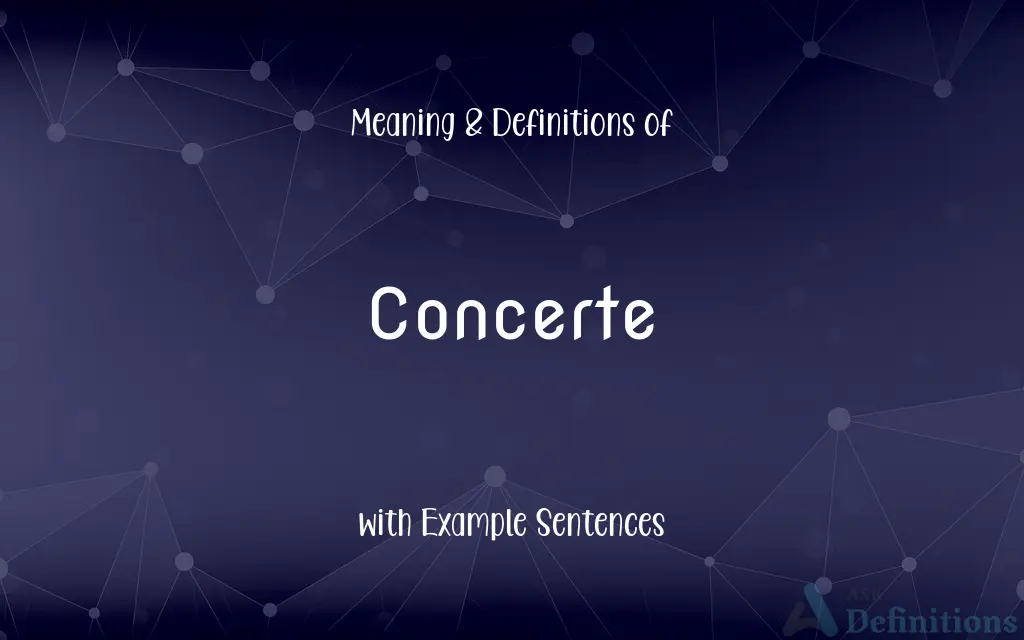
Table of Contents
Concrete Definitions
Concrete refers to a building material made from a mixture of cement, water, sand, and gravel, known for its strength and durability.
The new sidewalk was paved with concrete.
Existing in a material or physical form; real or solid; not abstract.
She prefers concrete examples to understand complex theories.
Referring to objects or events that can be perceived by the senses.
Children often think in concrete terms before understanding abstract concepts.
Relating to an actual, specific thing or instance; particular.
He had no concrete plans for the weekend.
A hard, solid construction material composed of cement, sand, aggregate, and water.
They used reinforced concrete for the foundation.
Pertaining to or concerned with realities or actual instances rather than abstractions.
The research provides concrete evidence supporting the hypothesis.
Forming a tangible or visible result.
The policy changes had no concrete effect on the majority of people.
Specific, definite, and not vague.
The teacher asked for a concrete answer, not generalizations.
Solidified or made firm.
Once the agreement was signed, their plans became concrete.
Unyielding or rigid in character or quality.
His stance on the issue was as concrete as ever.
Used to describe music or art that is characterized by realistic or naturalistic depiction.
The artist is known for her concrete representations of urban landscapes.
Of or relating to an actual, specific thing or instance; particular
Had the concrete evidence needed to convict.
Relating to nouns, such as flower or rain, that denote a material or tangible object or phenomenon.
Existing in reality or in real experience; perceptible by the senses; real
Concrete objects such as trees.
Formed by the coalescence of separate particles or parts into one mass; solid.
Made of hard, strong, conglomerate construction material.
A hard, strong construction material consisting of sand, conglomerate gravel, pebbles, broken stone, or slag in a mortar or cement matrix.
A mass formed by the coalescence of particles.
To build, treat, or cover with hard, strong conglomerate construction material.
To form into a mass by coalescence or cohesion of particles or parts.
To harden; solidify.
Real, actual, tangible.
Fuzzy videotapes and distorted sound recordings are not concrete evidence that Bigfoot exists.
Once arrested, I realized that handcuffs are concrete, even if my concept of what is legal wasn’t.
Being or applying to actual things, not abstract qualities or categories.
Particular, specific, rather than general.
While everyone else offered thoughts and prayers, she made a concrete proposal to help.
Concrete ideas
United by coalescence of separate particles, or liquid, into one mass or solid.
Made of concrete, a building material.
The office building had concrete flower boxes out front.
(obsolete) A solid mass formed by the coalescence of separate particles; a compound substance, a concretion.
Specifically, a building material created by mixing cement, water, and aggregate such as gravel and sand.
The road was made of concrete that had been poured in large slabs.
(logic) A term designating both a quality and the subject in which it exists; a concrete term.
Sugar boiled down from cane juice to a solid mass.
(US) A dessert of frozen custard with various toppings.
(chemistry) An extract of herbal materials that has a semi-solid consistency, especially when such materials are partly aromatic.
To cover with or encase in concrete (building material).
I hate grass, so I concreted over my lawn.
To solidify: to change from being abstract to being concrete (actual, real).
To unite or coalesce into a mass or a solid body.
United in growth; hence, formed by coalition of separate particles into one mass; united in a solid form.
The first concrete state, or consistent surface, of the chaos must be of the same figure as the last liquid state.
Standing for an object as it exists in nature, invested with all its qualities, as distinguished from standing for an attribute of an object; - opposed to abstract.
Concrete is opposed to abstract. The names of individuals are concrete, those of classes abstract.
Concrete terms, while they express the quality, do also express, or imply, or refer to, some subject to which it belongs.
A compound or mass formed by concretion, spontaneous union, or coalescence of separate particles of matter in one body.
To divide all concretes, minerals and others, into the same number of distinct substances.
A mixture of gravel, pebbles, or broken stone with cement or with tar, etc., used for sidewalks, roadways, foundations, etc., and esp. for submarine structures.
A term designating both a quality and the subject in which it exists; a concrete term.
The concretes "father" and "son" have, or might have, the abstracts "paternity" and "filiety".
Sugar boiled down from cane juice to a solid mass.
To unite or coalesce, as separate particles, into a mass or solid body.
To form into a mass, as by the cohesion or coalescence of separate particles.
There are in our inferior world divers bodies that are concreted out of others.
To cover with, or form of, concrete, as a pavement.
A strong hard building material composed of sand and gravel and cement and water
Cover with cement;
Concrete the walls
Form into a solid mass; coalesce
Capable of being perceived by the senses; not abstract or imaginary;
Concrete objects such as trees
Formed by the coalescence of particles
Concrete Snonyms
Specific
Clearly defined or identified.
The project had specific goals to be met.
Tangible
Perceptible by touch; clear and definite, real.
The results of the experiment were tangible.
Material
Relating to physical matter; bodily.
The evidence was material to solving the case.
Cement
A powdery substance made with calcined lime and clay, used to make concrete.
They mixed cement with water to create the sidewalk.
Solid
Firm and stable in shape; not liquid or fluid.
The sculpture was carved from a solid block of marble.
Real
Actually existing as a thing or occurring in fact.
The fear of losing her job was very real.
Actual
Existing in fact; typically as contrasted with what was intended, expected, or believed.
The actual cost exceeded the estimates.
Physical
Relating to the body as opposed to the mind; material.
The job requires physical strength.
Factual
Concerned with what is actually the case.
The journalist checked the factual accuracy of the report.
Definite
Clearly stated or decided; not vague or doubtful.
The meeting is scheduled for a definite time.
Concrete Idioms & Phrases
Hard as concrete
Extremely hard or tough.
The old bread felt as hard as concrete.
Set in concrete
To be fixed and unchangeable.
The travel plans were not set in concrete.
Concrete jungle
An urban area filled with large buildings and lacking pleasant green spaces.
He wanted to escape the concrete jungle for the weekend.
Pouring concrete
Starting to build or create something solid or lasting.
We're pouring concrete for the new development next week.
Concrete steps
Specific, actionable steps towards achieving a goal.
The government promised to take concrete steps to address the issue.
Concrete ideas
Ideas that are clear, specific, and easily understood.
The team brainstormed concrete ideas for the product launch.
Concrete evidence
Evidence that is solid, tangible, and reliable.
The prosecutor presented concrete evidence at the trial.
To be concrete about something
To be clear and specific about something.
Please be concrete about your intentions.
Laid in concrete
Firmly established or determined.
The company's values are laid in concrete.
Cast in concrete
To make something permanent or difficult to change.
The agreement was practically cast in concrete.
From the concrete to the abstract
Moving from specific, tangible concepts to broader, more theoretical ideas.
The lecture moved from the concrete to the abstract.
Solid as concrete
Very strong or reliable.
Their friendship is solid as concrete.
Under concrete skies
In an urban, industrial environment with little visible sky.
Growing up under concrete skies influenced his artwork.
Concrete plans
Well-defined, detailed plans.
They had concrete plans for renovating the house.
In concrete terms
Speaking or thinking about something in a clear, specific way.
He explained the process in concrete terms.
Molded in concrete
Shaped or influenced in a way that is difficult to change.
His opinions are molded in concrete.
The concrete meets the road
Where theory or planning meets the reality of execution.
It's where the concrete meets the road that we'll see if the idea works.
Break the concrete ceiling
To overcome a very hard or seemingly impossible barrier to progress.
She was determined to break the concrete ceiling in her field.
Concrete thinking
Thinking that is literal and focused on the physical world.
Children often engage in concrete thinking before developing abstract reasoning skills.
Lay the concrete
To establish a strong foundation or basis.
The early training sessions lay the concrete for future success.
Concrete Example Sentences
They poured concrete for the new foundation today.
The concrete driveway needs to be repaired.
Concrete walls enclose the entire property.
She provided concrete examples to illustrate her point.
The museum's architecture is a mix of glass and concrete.
His advice was practical and concrete.
She has a talent for making complex ideas concrete.
The contractor recommended using lightweight concrete.
Concrete details help make a story more believable.
The sculpture was made of concrete and metal.
He prefers concrete data over theoretical assumptions.
The urban landscape is dominated by concrete structures.
The project aims to replace old concrete roads with asphalt.
We need a concrete plan of action by tomorrow.
The engineer tested the concrete for durability.
Common Curiosities
How many syllables are in concrete?
Concrete has two syllables.
How is concrete used in a sentence?
Concrete is often used to refer to the building material, e.g., The foundation is made of concrete.
Why is it called concrete?
Concrete comes from the Latin word "concretus," meaning compact or condensed. It reflects the material's nature as a composite mixture that hardens into a durable building material.
What is a stressed syllable in concrete?
The stressed syllable in "concrete" is the second syllable: crete.
What part of speech is concrete?
Concrete is both a noun, referring to the construction material, and a verb, meaning to cover an area with this material.
What is the first form of concrete?
As a noun, the first form of concrete is "concrete" itself, referring to the building material.
What is another term for concrete?
Another term for concrete is "cement," although technically, cement is just one component of concrete.
How do we divide concrete into syllables?
Concrete is divided into syllables as con-crete.
What is the verb form of concrete?
The verb form related to concrete is "to concrete," meaning to cover an area with concrete. e.g., "They plan to concrete the garden path."
What is the singular form of concrete?
The singular form is "concrete," which can refer to the substance in general or a specific quantity or piece of it.
What is the root word of concrete?
The root of "concrete" is the Latin "concretus," meaning to grow together or to harden.
What is the third form of concrete?
The third form or past participle of the verb "to concrete" is also "concreted."
What is the pronunciation of concrete?
Concrete is pronounced as /ˈkɒn.kriːt/ or /kənˈkriːt/, depending on the context as a noun or verb.
What is the second form of concrete?
When considering the verb "to concrete," the second form or the past tense is "concreted."
Is concrete a noun or adjective?
Concrete is primarily a noun but can also be used as an adjective to describe something real, specific, and tangible, in contrast to abstract.
Is the concrete term a metaphor?
The term "concrete" can be used metaphorically to describe ideas or plans that are solid and well-defined, in contrast to those that are vague or abstract.
Which determiner is used with concrete?
Determiners such as "the," "some," or "any" can be used with concrete, depending on whether you are referring to a specific instance or concrete in general.
Which vowel is used before concrete?
The articles "a" or "an" are not typically used directly before "concrete" because it is uncountable when referring to the material itself. However, "a" can be used when "concrete" is an adjective, e.g., "a concrete example."
What is the opposite of concrete?
The opposite of concrete, in terms of abstractness, could be "abstract." In terms of material, an opposite might be considered "natural" or "earthen."
Is concrete an adverb?
No, concrete is not an adverb.
Is concrete a vowel or consonant?
The word "concrete" begins with a consonant.
Is concrete a countable noun?
Yes, when referring to different types or pieces of concrete, it can be considered a countable noun.
Is concrete a collective noun?
No, concrete is not typically considered a collective noun.
Is the word concrete imperative?
No, "concrete" is not inherently imperative. However, in its verb form, it could be used in an imperative sentence, e.g., "Concrete the driveway."
Is the word concrete Gerund?
No, "concrete" is not a gerund. The gerund form of the verb "to concrete" would be "concreting."
Which preposition is used with concrete?
Prepositions such as "of," "in," and "with" are used with concrete, e.g., "a piece of concrete," "concrete in construction," "mixed with concrete."
Which conjunction is used with concrete?
Conjunctions such as "and" or "but" can be used with concrete, depending on the sentence, e.g., "Concrete and steel are essential for construction."
What is the plural form of concrete?
The plural form of concrete is "concretes," though it is less commonly used and typically refers to different types or mixes of concrete.
Is concrete an abstract noun?
No, concrete is not an abstract noun. When used as a noun, it refers to a physical material. When used as an adjective, it describes something tangible.
Is the word “concrete” a Direct object or an Indirect object?
As a noun, "concrete" can be a direct object, e.g., "The workers poured the concrete." It is not used as an indirect object.
Is concrete a negative or positive word?
Concrete is neutral; its connotation depends on the context in which it is used.
Which article is used with concrete?
The definite article "the" is commonly used with concrete when referring to a specific instance of the material, e.g., "the concrete foundation."
Share Your Discovery
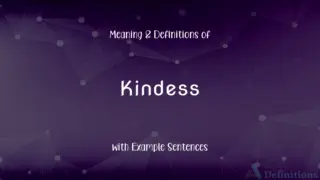
Previous Term
Kindess Meaning and Definition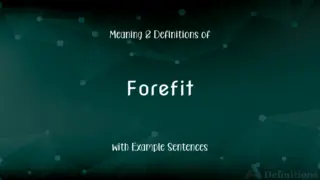
Next Term
Forefit Meaning and Definition
